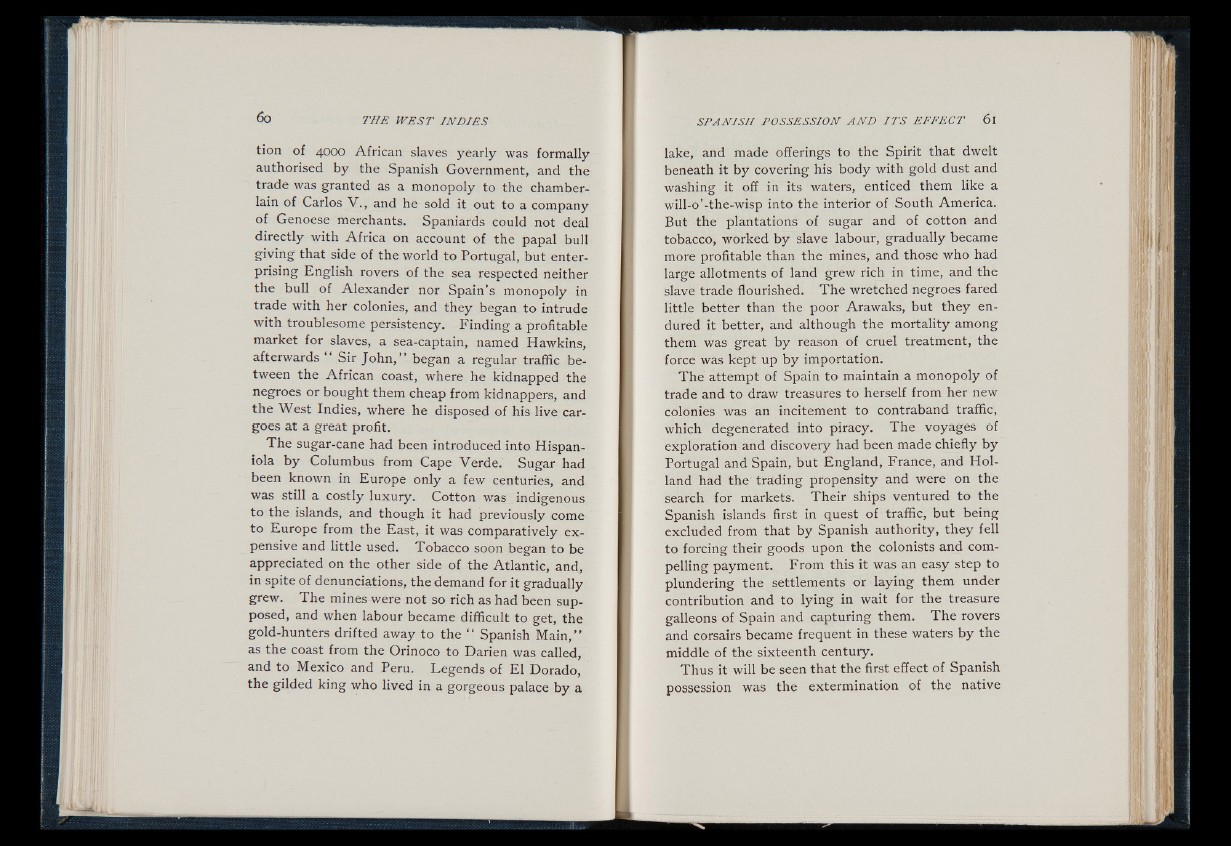
tion of 4000 African slaves yearly was formally
authorised by the Spanish Government, and the
trade was granted as a monopoly to the chamber-
lain of Carlos V . , and he sold it out to a company
of Genoese merchants. Spaniards could not deal
directly with Africa on account of the papal bull
giving that side of the world to Portugal, but enterprising
English rovers of the sea respected neither
the bull of Alexander nor Spain’s monopoly in
trade with her colonies, and they began to intrude
with troublesome persistency. Finding a profitable
market for slaves, a sea-captain, named Hawkins,
afterwards “ Sir John,” began a regular traffic between
the African coast, where he kidnapped the
negroes or bought them cheap from kidnappers, and
the West Indies, where he disposed of his live cargoes
at a great profit.
The sugar-cane had been introduced into Hispaniola
b y Columbus from Cape Verde. Sugar had
been known in Europe only a few centuries, and
was still a costly luxury. Cotton was indigenous
to the islands, and though it had previously come
to Europe from the East, it was comparatively e x pensive
and little used. Tobacco soon began to be
appreciated on the other side of the Atlantic, and,
in spite of denunciations, the demand for it gradually
grew. T h e mines were not so rich as had been supposed,
and when labour became difficult to get, the
gold-hunters drifted away to the “ Spanish Main,”
as the coast from the Orinoco to Darien was called,
and to Mexico and Peru. Legends of El Dorado,
the gilded king who lived in a gorgeous palace by a
lake, and made offerings to the Spirit that dwelt
beneath it by covering his body with gold dust and
washing it off in its waters, enticed them like a
will-o’-the-wisp into the interior of South America.
But the plantations of sugar and of cotton and
tobacco, worked by slave labour, gradually became
more profitable than the mines, and those who had
large allotments of land grew rich in time, and the
slave trade flourished. T h e wretched negroes fared
little better than the poor Arawaks, but they endured
it better, and although the mortality among
them was great by reason of cruel treatment, the
force was kept up by importation.
T he attempt of Spain to maintain a monopoly of
trade and to draw treasures to herself from her new
colonies was an incitement to contraband traffic,
which degenerated into piracy. T h e voyages of
exploration and discovery had been made chiefly by
Portugal and Spain, but England, France, and Holland
had the trading propensity and were on the
search for markets. Their ships ventured to the
Spanish islands first in quest of traffic, but being
excluded from that by Spanish authority, they fell
to forcing their goods upon the colonists and compelling
payment. From this it was an easy step to
plundering the settlements or laying them under
contribution and to lying in wait for the treasure
galleons of Spain and capturing them. T h e rovers
and corsairs became frequent in these waters by the
middle of the sixteenth century.
Thus it will be seen that the first effect of Spanish
possession was the extermination of the native